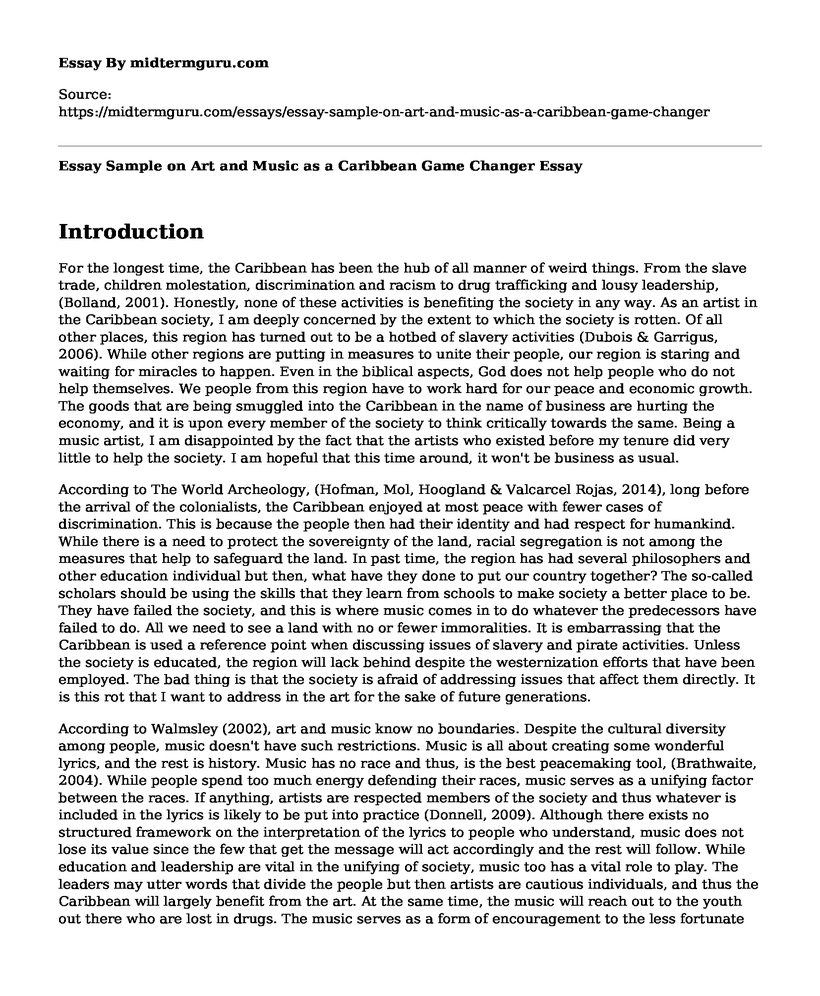Introduction
For the longest time, the Caribbean has been the hub of all manner of weird things. From the slave trade, children molestation, discrimination and racism to drug trafficking and lousy leadership, (Bolland, 2001). Honestly, none of these activities is benefiting the society in any way. As an artist in the Caribbean society, I am deeply concerned by the extent to which the society is rotten. Of all other places, this region has turned out to be a hotbed of slavery activities (Dubois & Garrigus, 2006). While other regions are putting in measures to unite their people, our region is staring and waiting for miracles to happen. Even in the biblical aspects, God does not help people who do not help themselves. We people from this region have to work hard for our peace and economic growth. The goods that are being smuggled into the Caribbean in the name of business are hurting the economy, and it is upon every member of the society to think critically towards the same. Being a music artist, I am disappointed by the fact that the artists who existed before my tenure did very little to help the society. I am hopeful that this time around, it won't be business as usual.
According to The World Archeology, (Hofman, Mol, Hoogland & Valcarcel Rojas, 2014), long before the arrival of the colonialists, the Caribbean enjoyed at most peace with fewer cases of discrimination. This is because the people then had their identity and had respect for humankind. While there is a need to protect the sovereignty of the land, racial segregation is not among the measures that help to safeguard the land. In past time, the region has had several philosophers and other education individual but then, what have they done to put our country together? The so-called scholars should be using the skills that they learn from schools to make society a better place to be. They have failed the society, and this is where music comes in to do whatever the predecessors have failed to do. All we need to see a land with no or fewer immoralities. It is embarrassing that the Caribbean is used a reference point when discussing issues of slavery and pirate activities. Unless the society is educated, the region will lack behind despite the westernization efforts that have been employed. The bad thing is that the society is afraid of addressing issues that affect them directly. It is this rot that I want to address in the art for the sake of future generations.
According to Walmsley (2002), art and music know no boundaries. Despite the cultural diversity among people, music doesn't have such restrictions. Music is all about creating some wonderful lyrics, and the rest is history. Music has no race and thus, is the best peacemaking tool, (Brathwaite, 2004). While people spend too much energy defending their races, music serves as a unifying factor between the races. If anything, artists are respected members of the society and thus whatever is included in the lyrics is likely to be put into practice (Donnell, 2009). Although there exists no structured framework on the interpretation of the lyrics to people who understand, music does not lose its value since the few that get the message will act accordingly and the rest will follow. While education and leadership are vital in the unifying of society, music too has a vital role to play. The leaders may utter words that divide the people but then artists are cautious individuals, and thus the Caribbean will largely benefit from the art. At the same time, the music will reach out to the youth out there who are lost in drugs. The music serves as a form of encouragement to the less fortunate who are almost losing hope due to the poor living conditions that manifest themselves in the Caribbean. Music reaches out to all there is a high probability that the society will change courtesy of music.
References
Bolland, O. N. (2001). The politics of labor in the British Caribbean: the social origins of authoritarianism and democracy. James Currey.
Brathwaite, K. (2004). History of the voice: The development of national language in Anglophone Caribbean poetry. New Beacon.
Donnell, A. (2007). Twentieth-century Caribbean literature: Critical moments in Anglophone literary history. Routledge.
Dubois, L., & Garrigus, J. D. (2006). Slave revolution in the Caribbean, 1789-1804: A brief history with documents (p. 188). New York: Bedford/St. Martin's.
Grosfoguel, R. (2003). Colonial subjects: Puerto Ricans in a global perspective. Univ of California Press.
Hofman, C., Mol, A., Hoogland, M., & Valcarcel Rojas, R. (2014). Stage of encounters: migration, mobility, and interaction in the pre-colonial and early colonial Caribbean. World Archaeology, 46(4), 590-609.
Walmsley, A. (2002). The Caribbean artists' movement, 1966-1972: a literary & cultural history. New Beacon.
Cite this page
Essay Sample on Art and Music as a Caribbean Game Changer. (2022, Sep 19). Retrieved from https://midtermguru.com/essays/essay-sample-on-art-and-music-as-a-caribbean-game-changer
If you are the original author of this essay and no longer wish to have it published on the midtermguru.com website, please click below to request its removal:
- Essay on Conservation for Museum Collections
- Eminem as the Greatest Rapper - Art Essay Example
- How Has Social Media Affected Education, Knowledge, and Literacy Rates?
- Musical Rhythm Research Proposal
- Research Paper on Wentworth Room From 17th Century
- Movie Analysis Essay on The Wizard of Oz
- Explore Ancient Egypt and Greece Artifacts With Virtual Museum Technology - Research Paper







